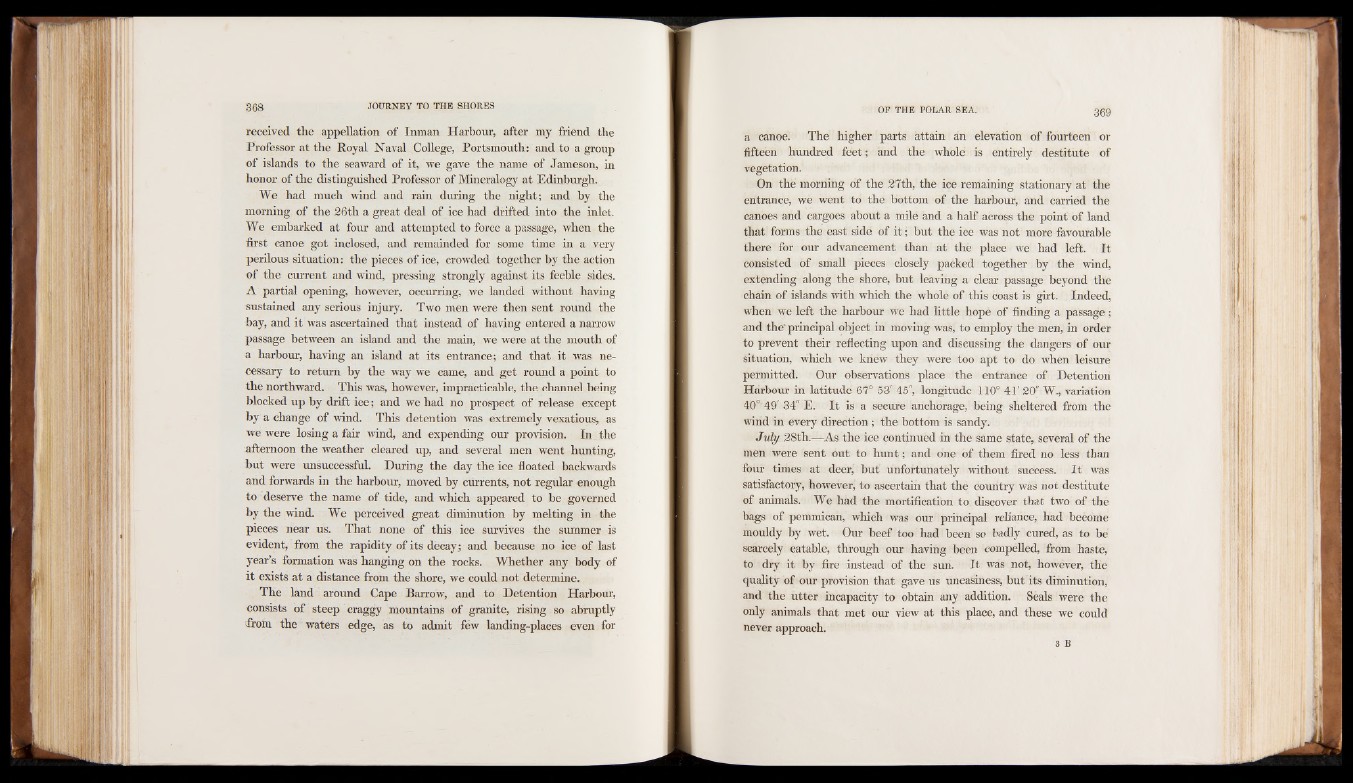
received the appellation of Inman Harbour, after my friend the
Professor at the Royal Naval College, Portsmouth: and to a group
of islands to the seaward of it, we gave the name of Jameson, in
honor of the distinguished Professor of Mineralogy at Edinburgh.
We had much wind and rain during the night; and by the
morning of the 26th a great deal of ice had drifted into the inlet.
We embarked at four and attempted to force a passage, when the
first canoe got inclosed, and remainded for some time in a very
perilous situation: the pieces of ice, crowded together by the action
of the current and wind, pressing strongly against its feeble sides.
A partial opening, however, occurring, we landed without having
sustained any serious injury. Two men were then sent round the
bay, and it was ascertained that instead of having entered a narrow
passage between an island and the main, we were at the mouth of
a harbour, having an island at its entrance; and that it was necessary
to return by the way we came, and get round a point to
the northward. This was, however, impracticable, the channel being
blocked up by drift ice; and we had no prospect of release except
by a change of wind. This detention was extremely vexatious, as
we were losing a fair wind, and expending our provision. In the
afternoon the weather cleared up, and several men went hunting,
but were unsuccessful. During the day the ice floated backwards
and forwards in the harbour, moved by currents, not regular enough
to deserve the name of tide, and which appeared to be governed
by the wind. We perceived great diminution by melting in the
pieces near us. That none of this ice survives the summer is
evident, from the rapidity of its decay; and because no ice of last
year’s formation was hanging on the rocks. Whether any body of
it exists at a distance from the shore, we could not determine.
The land around Cape Barrow, and to Detention Harbour,
consists of steep craggy mountains of granite, rising so abruptly
from the waters edge, as to admit few landing-places even for
a canoe! The higher parts attain an elevation of fourteen or
fifteen hundred feet; and the whole is entirely destitute of
vegetation.
On the morning of the 27th, the ice remaining stationary at the
entrance, we went to the bottom of the harbour, and carried the
canoes and cargoes about a mile and a half across the point of land
that forms the east side of it ; but the ice was not more favourable
there for our advancement than at the place we had left. It
consisted of small pieces closely packed together by the wind,
extending along the shore, but leaving a clear passage beyond the
chain of islands with which the whole of this coast is girt. Indeed,
when we left the harbour we had little hopé of finding a passage ;
and the'principal object in moving was, to employ the men, in order
to prevent their reflecting upon and discussing the dangers of our
situation, which we knew they were too apt to do when leisure
permitted. Our observations place the entrance of Detention
Harbour in latitude 67° 53' 45", longitude 110° 41' 20" W., variation
40° 49'34" E. It is a secure anchorage, being sheltered from the
wind in every direction; the bottom is sandy.
July 28th.—As the ice continued in the same state, several of the
men were sent out to hunt; and one of them fired no less than
four times at deer, but unfortunately without success. It was
satisfactory, however, to ascertain that the country was not destitute
of animals. We had the mortification to discover that two of the
bags of pemmican, which was our principal reliance, had become
mouldy by wet. Our beef too had been so badly cured, as to be
scarcely eatable, through our having been compelled, from haste,
to dry it by fire instead of the sun. It was not, however, the
quality of our provision that gave us uneasiness, but its diminution,
and the utter incapacity to obtain any addition. Seals were the
only animals that met our view at this place, and these we could
never approach.